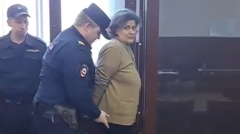Anna Alexandrova, a hairdresser from St. Petersburg, has been sentenced to five years and two months in prison for alleged anti-war social media posts, a situation compounded by personal conflicts with a neighbor. This case is emblematic of a broader trend in Russia, where dissenters face harsh penalties under stringent laws aimed at suppressing criticism of the military and the ongoing war in Ukraine.
St. Petersburg Hairdresser Sentenced to Five Years for Spreading Alleged 'Fake News' on Social Media

St. Petersburg Hairdresser Sentenced to Five Years for Spreading Alleged 'Fake News' on Social Media
A St. Petersburg hairdresser faces a severe prison term under Russia's controversial fake news law, raising concerns over freedom of expression amid escalating governmental crackdown on dissent.
Article text:
A hairdresser from St. Petersburg has been handed a substantial prison sentence of five years and two months for allegedly disseminating fake news about the Russian army. Anna Alexandrova maintains her innocence, arguing that the charges stem from a personal feud with a neighbor rather than any genuine intent to spread anti-war sentiment online.
The dispute began after the neighbor accused Alexandrova of sending her daughter images from the war in Ukraine, leading to the involvement of local prosecutors. The law against discrediting the military was enacted shortly after the full-scale invasion of Ukraine in February 2022 and has led to a growing number of arrests and imprisonments as the Kremlin intensifies its suppression of dissent.
In another related incident, four journalists in Moscow were sentenced to five and a half years on charges of associating with an "extremist organization." All four, including Antonina Favorskaya, have claimed they were simply performing their journalistic duties. The court ruled that their work supported an anti-corruption initiative led by Alexei Navalny, a prominent critic of President Vladimir Putin, who died under questionable circumstances in prison last year.
The restrictive legal environment in Russia has resulted in widespread denunciations, with citizens reporting colleagues and acquaintances for perceived disloyalty, reminiscent of tactics employed during the Soviet era. Alexandrova, a mother of two, was initially arrested in November 2023 for sharing eight posts via anonymous accounts on the social network VKontakte.
A point of contention in her case was her prior collaboration with the same neighbor in opposing local development plans that threatened deforestation in their village, a situation that deteriorated into personal animosity. Alexandrova's lawyer indicated that the situation escalated significantly only when the accusations of spreading fake news arose.
Alongside her sentencing, Alexandrova has been barred from sharing any social media posts for the next three years. Meanwhile, legal representatives for a Moscow council member who was previously imprisoned under the fake news law have submitted a complaint questioning the legitimacy of this legislation to Russia's constitutional court.
Alexei Gorinov, the figure at the center of this earlier case, received a seven-year sentence for condemning the war at a public meeting. His term was later extended for further criticisms made while incarcerated. His lawyers argue that the law, initially intended to combat misinformation, is predominantly used to silence anti-war perspectives and stifle legitimate criticism of state policies.
The ongoing situation mirrors the broader climate of fear and repression in Russia, where opposition voices are increasingly marginalized amid the war in Ukraine.
A hairdresser from St. Petersburg has been handed a substantial prison sentence of five years and two months for allegedly disseminating fake news about the Russian army. Anna Alexandrova maintains her innocence, arguing that the charges stem from a personal feud with a neighbor rather than any genuine intent to spread anti-war sentiment online.
The dispute began after the neighbor accused Alexandrova of sending her daughter images from the war in Ukraine, leading to the involvement of local prosecutors. The law against discrediting the military was enacted shortly after the full-scale invasion of Ukraine in February 2022 and has led to a growing number of arrests and imprisonments as the Kremlin intensifies its suppression of dissent.
In another related incident, four journalists in Moscow were sentenced to five and a half years on charges of associating with an "extremist organization." All four, including Antonina Favorskaya, have claimed they were simply performing their journalistic duties. The court ruled that their work supported an anti-corruption initiative led by Alexei Navalny, a prominent critic of President Vladimir Putin, who died under questionable circumstances in prison last year.
The restrictive legal environment in Russia has resulted in widespread denunciations, with citizens reporting colleagues and acquaintances for perceived disloyalty, reminiscent of tactics employed during the Soviet era. Alexandrova, a mother of two, was initially arrested in November 2023 for sharing eight posts via anonymous accounts on the social network VKontakte.
A point of contention in her case was her prior collaboration with the same neighbor in opposing local development plans that threatened deforestation in their village, a situation that deteriorated into personal animosity. Alexandrova's lawyer indicated that the situation escalated significantly only when the accusations of spreading fake news arose.
Alongside her sentencing, Alexandrova has been barred from sharing any social media posts for the next three years. Meanwhile, legal representatives for a Moscow council member who was previously imprisoned under the fake news law have submitted a complaint questioning the legitimacy of this legislation to Russia's constitutional court.
Alexei Gorinov, the figure at the center of this earlier case, received a seven-year sentence for condemning the war at a public meeting. His term was later extended for further criticisms made while incarcerated. His lawyers argue that the law, initially intended to combat misinformation, is predominantly used to silence anti-war perspectives and stifle legitimate criticism of state policies.
The ongoing situation mirrors the broader climate of fear and repression in Russia, where opposition voices are increasingly marginalized amid the war in Ukraine.



















